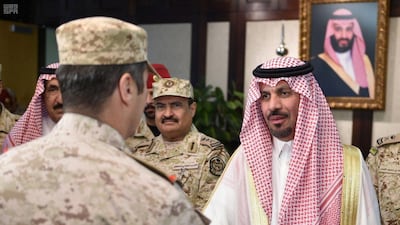Relatively unknown to most Saudis before his appointment to the head of the National Guard, Prince Khalid bin Abdulaziz bin Mohammed bin Ayyaf Al Muqren now holds one of the most prestigious positions in the kingdom's hierarchy.
The National Guard, an internal security force, is separate from the regular Saudi army and tasked with — among other things — protecting the royal family. As a result, its members are deeply loyal to the ruling House of Saud, and its most senior post has previously been filled by royal family members who have gone on to reach the highest echelons of government or even become the crown prince or king.
Prince Khalid, whose appointment was announced on Saturday night, replaces Prince Miteb bin Abdullah, son of the late King Abdullah bin Abdulaziz and once thought to be a possible contender for the throne.
Prince Khalid, who began his career with the National Guard in 2007, has the force running through his veins. His father, Prince Abdulaziz bin Mohammed, was one of the Guard's founders, helping King Abdullah in the early 1960s to transform the force into what it is today.
The prince’s family traces its lineage back to Saud, the ancestor of the current ruler of Saudi Arabia, King Salman.
________________
Read more:
Saudi Arabia says prince 'alive and well' after rumours of his death
Beyond the Headlines podcast: Saudi anti-corruption efforts gather pace
Opinion: Saudi crown prince banking on younger generation to help reforms succeed
________________
Unlike the other two branches of the Saudi military, which are managed by the ministry of defence, the National Guard falls under the purview of the ministry of the national guard. Its 100,000 to 200,000 members are highly trained and it represents one of the most powerful institutions in the country.
Today the Guard is structured as a modern military force, but its composition remains based on a century-old legacy of tribal affiliations. Its origins predate modern Saudi Arabia, with the first iteration of the Guard formed in 1911 as a loose coalition of tribal war chiefs fiercely loyal to the sweeping conquest launched by the founding father of Saudi Arabia, King Abdulaziz.
Known as the Ikhwaan, these tribesman rode with the king during his battles and proved instrumental in his conquering of the lands that form the borders of Saudi Arabia today.
In 1924, after more than a decade of fighting, the force cemented their place in the history books with their central role in the conquest of Hejaz. The king of Hejaz fled Makkah, yielding the city to the House of Saud.
To this day, the force — which won the name of "White Army" for the traditional white thobes they wore in battle as opposed to western military fatigues — is still tasked with protecting Makkah and Madinah, Islam’s two holiest sites.
Carrying out this duty, the most important religious task entrusted to any security force in the kingdom, has seen the Guard prove its battle-worthiness.
From its foundation as the holiest site in Islam more than 1,400 years ago until today, Makkah has been the scene of some of the most dramatic uprisings in Islamic history.
In 1979, a group of extremist insurgents calling for the overthrow of the House of Saud took over the Holy Mosque in Makkah, claiming that the Mahdi, the redeemer of Islam, has reappeared as part of the coming Armageddon.
The seizure of Islam’s holiest site came as a shock to the Islamic world, though the National Guard, supported by Pakistani and French forces, was able to reclaim the mosque.
Historically, the Guard’s role has also been to defend Saudi Arabia from internal threats, including the suppressing of uprisings within the kingdom. Today it is fulfilling this role with its counterinsurgency campaign in Qatif, an area of the kingdom's Eastern Province.
When needed, the force also serves as the last line of defence against external threats, as seen in the deployment of several Guard brigades during Iraq’s invasion of Kuwait in 1990.
________________
Read more:
Senior Saudi figures accused of bribery and extortion
Editorial: Saudi Arabia’s urgent mission gathers speed
Saudi prince killed in helicopter crash near Yemen border
________________
It’s primary function remains protecting the royal family, however, and, with its members historically staunch in their loyalty to the Saudi royal family, the Guard has been used in the past as a counterbalance to the regular military.
Since the 1970s, the United States has trained and equipped the National Guard. Its battalions now operate as motorised rapid deployment forces capable of quickly travelling across the kingdom’s land mass, the twelfth largest in the world.
As a result of its loyalty and track record of securing stability in the kingdom, the National Guard has grown not only in military strength but also in its political clout.
The late King Abdullah himself served as the head of the force in its current iteration when it was formed in 1962, and went on to command the force until five years into his reign before discharging himself at the age of 87.
So important is the role of the head of the National Guard that in May 2013 King Abdullah promoted his son Prince Miteb, who was then a contender for the throne, to the post.

